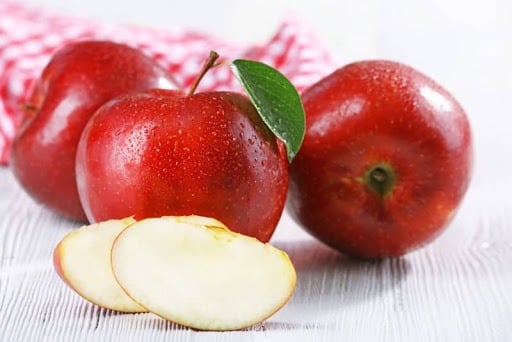Apple’s Secret to Blood Sugar Control
For diabetics, apples are considered a supportive health “companion”. Research indicates that apples are rich in pectin and fiber, which slow down carbohydrate absorption, thereby stabilizing blood sugar levels. Notably, consuming apples about 30 minutes before a meal can significantly reduce post-meal blood sugar spikes.
Additionally, apples have a low glycemic index (GI) and glycemic load, meaning they have minimal impact on post-meal blood sugar levels. This makes apples an ideal choice for individuals with diabetes. However, while apples offer benefits in blood sugar management, they cannot replace medication entirely. Patients should still adhere to their doctor’s instructions and maintain a scientific diet for the best results.

The Truth About Apple Consumption Timing
There’s an old saying: “An apple in the morning is golden, an apple at noon is silver, and an apple at night is poisonous.” However, this is merely a folk belief without scientific backing. In reality, the nutritional value of apples remains constant regardless of the time of day. Whether consumed in the morning, noon, or night, apples provide numerous health benefits when eaten in moderation.
From a digestive perspective, eating apples in the morning can stimulate the stomach and aid digestion; consuming them at noon can provide timely energy for the body. If eaten at night, it’s advisable not to overeat to prevent sleep disturbances. Overall, there is no “golden time” to eat apples; it’s about choosing a time that suits individual habits and needs.
Apple’s Potential in Cancer Prevention
Apples contain beneficial compounds such as pectin and triterpenoids, which act as a protective “shield” against cancer cell development.
Laboratory studies have indicated that these components may reduce the risk of certain cancers, including colorectal and lung cancer. However, most of these experiments were conducted on cell models, and further research is needed to confirm similar effects in humans.

Nonetheless, incorporating apples into your daily diet brings numerous health advantages. One apple a day provides not only vitamins and minerals but also boosts immunity and contributes to overall health improvement.
Apple’s Role in Longevity
Apples are abundant in antioxidants like flavonoids and triterpenoids, which reduce inflammation and safeguard the body from free radical damage. Studies reveal that individuals who eat an apple daily may decrease their risk of mortality by approximately 35%.
Notably, apple peels contain a high concentration of antioxidants, so it’s advisable to consume the fruit with its peel to maximize nutritional benefits. Many people worry about the wax coating on apples, but there are three types of wax to consider:
Industrial wax: May contain heavy metals like lead, posing health risks.
Artificial wax: Made from natural ingredients, safe for consumption.
Natural wax from apples: Produced by the fruit itself, protects against bacteria, and prolongs freshness.
Therefore, when selecting apples of known origin, you can confidently eat the peel to optimize nutrient intake.
Apple, the Heart’s Guardian
The heart, being a vital organ, acts as the body’s “engine”. Any issues can lead to severe conditions like cardiovascular disease, atherosclerosis, angina, or myocardial infarction. Apples are considered a supportive companion for heart health, thanks to their ability to reduce bad cholesterol (LDL), prevent atherosclerosis, and maintain stable blood flow.
The fiber and antioxidant content in apples also act as a “cleaner” for blood vessels, removing plaque buildup and reducing the risk of blockages. Regular apple consumption can contribute to enhanced heart function and a decreased likelihood of cardiovascular issues.
Tips for Selecting and Storing Apples Properly
How to choose fresh apples:
Look for smooth-skinned apples with bright colors and no bruises or dents. Smell the apple; a fresh apple should have a distinct aroma. If it smells odd, it may be rotten.
Check for firmness by gently pressing the fruit. A fresh apple will have good resilience.
How to store apples:
Wrap apples in a storage bag and keep them in the refrigerator’s crisper drawer.
Avoid storing apples with other fruits, as some fruits release ethylene, which can cause apples to spoil faster.
Optimizing Apple’s Benefits: Timing and Methods
Apples are a nutrient-rich fruit offering various health advantages, including blood sugar control, cancer risk reduction, longevity enhancement, and cardiovascular protection.
To maximize these benefits, consume apples at the right time and in the appropriate manner. Include apples in your daily diet to take full advantage of their wonderful benefits!
The Blue Zones: Unveiling the Secrets to Longevity
Have you ever wondered about the secrets to longevity in the world’s Blue Zones? These are regions where people live not just long, but also healthy and happy lives. Join us as we uncover three unique lifestyle factors that set these populations apart and could potentially extend your lifespan, enhancing your overall quality of life.
Brown Rice and Diabetes: The Scientific Way to Manage Blood Sugar
Brown rice is a whole grain packed with fiber and essential nutrients, offering a plethora of health benefits, especially for those living with diabetes. To unlock its full potential and avoid any adverse effects, it is crucial for individuals with diabetes to understand the art of incorporating brown rice into their diet in a balanced and informed manner.



































